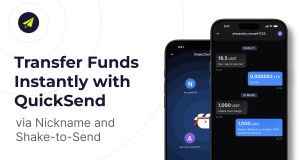What Are Investment DAOs and How Do They Work?

In the late 19th century, the first investment clubs were founded in Texas, where small communities gathered to discuss and make joint investments. Over 100 years later, this collective investment model has evolved, now finding a new home on the blockchain.
On this page
If you’ve bought a cryptocurrency—whether it’s Bitcoin, Ethereum, or another altcoin—you’ve likely aimed for the best possible return on investment (ROI). However, this isn’t always easy—token prices at launch are often higher than what venture capitalists (VCs) pay in earlier funding rounds.
While VCs have provided startups with significant funding opportunities, they come with certain limitations:
- First, VCs are governed by strict regulations, which can limit their choices, including which startups to back, how much to invest, and the methods of investment.
- Second, in VCs, decision-making is often concentrated in the hands of a few, which can lead to risks such as bias, capital manipulation, and undue influence over the startup’s operations after funding.
- Third, VCs are usually out of reach for the average investor. If you wanted to invest $1,000 in a startup through a VC, it would be nearly impossible.
As a result, VCs often capture the best opportunities, while regular investors are left with fewer options. This has pushed individuals to seek early investment opportunities through ICOs and other token sales, changing the startup funding landscape and allowing everyday crypto enthusiasts to become early investors.
However, even with token sales, users faced limitations: platforms imposed caps on the amount one could invest, required KYC verification, and getting onto the whitelist, which granted investment rights, was not guaranteed. Moreover, ICO platforms, not the users, typically decide which startups’ tokens could be purchased.
The market was ripe for a new, more decentralized alternative, which led to the rise of investment DAOs.
Definition of an Investment DAO
Before diving into what an Investment DAO is, it’s important to understand the concept of a DAO (Decentralized Autonomous Organization). A DAO is a blockchain-based community where decisions are made collectively by its members, with voting power distributed through token ownership rather than a traditional corporate hierarchy. The first well-known DAO was The DAO, launched in April 2016.
DAOs can serve various purposes: some are formed by groups of strangers online to fund meme creation, while others establish decentralized investment funds, lobbying groups, or service organizations.
DAOs manage a wide variety of businesses. Source: hackernoon.com
As the name suggests, investment DAOs are organizations where members pool their resources to invest in or develop startups, while maintaining transparent and decentralized decision-making. Though they may seem similar to mutual funds, there are several key differences:
- Investment DAOs operate entirely on the blockchain, whereas mutual funds are governed by national regulations.
- The rules governing a DAO are encoded in smart contracts, while mutual funds are regulated by legal frameworks specific to their jurisdictions.
- In a DAO, members vote on decisions collectively, unlike mutual funds where decisions are made by a few managers.
- Investment DAOs use governance tokens to determine voting power and profit shares, whereas mutual funds rely on shares or units without voting rights.
Many investment DAOs are composed of seasoned crypto enthusiasts, which allows them to leverage their networks for better investment opportunities. Moreover, these members often provide more targeted support to their portfolio companies than traditional venture capitalists, due to their deeper understanding of the crypto market, strategic connections, and expertise in social media marketing.
Funding an Investment DAO
Capital is essential for any investment. In traditional finance, large private investors and institutions usually provide the funds. However, in investment DAOs, the capital is often raised from regular cryptocurrency users. But how does this process work?
This is typically done through the sale of governance tokens. These tokens are placed in liquidity pools alongside other assets like BTC, ETH, or stablecoins. Users exchange their assets for DAO tokens, which are then used for investment purposes. The DAO tokens also grant holders voting rights and a share of any profits.
Additionally, some DAOs raise funds by selling branded NFTs. Depending on the organization, these NFTs might offer perks such as special status within the community, access to exclusive events, merchandise, or other valuable benefits.
Types of Investment DAOs
Investment DAOs come in various shapes and sizes, each with its own approach to capital distribution, decision-making processes, member participation, and investment proposals.
It's important to note that categorizing a DAO can be challenging because the creators may design a unique model that blends aspects of different types. As a result, a community might identify as a certain type, like a syndicate, but not strictly follow that model.
However, there are two primary types of investment DAOs commonly recognized.
Traditional Investment DAOs. Any member can propose an investment idea. If a majority of the participants vote in favor, the proposal is approved. The DAO's funding typically comes from selling governance tokens, which grant holders voting rights and a share of the profits.
Syndicate Model. The responsibility for finding and proposing investment ideas lies with a small group, usually experienced investors from traditional finance. Unlike traditional DAOs, members of a syndicate DAO do not fund the organization themselves; instead, the capital comes from external sources. Governance tokens or membership NFTs are used solely for voting.
Syndicate members can choose to invest their own money, but they primarily earn income by voting on successful proposals. Those who vote for profitable ideas receive a share of the resulting profits.
Apart from these two main types, there are also other models like DAO + Funds and Service DAOs. In the first model, DAO members set up a traditional investment fund but manage it using blockchain technology. Service DAOs don’t invest directly but instead provide support services, such as advising venture capital firms and startups, sharing valuable contacts, and offering strategic guidance.
Final Thoughts
As with any investment, it’s crucial to be cautious when choosing an investment DAO. Some DAOs may be legitimate and transparent, while others could be fraudulent, offering scam tokens disguised as governance tokens. Always research the activity of the DAO community on platforms like X and Discord, and review the success of the DAO’s previous projects.
Examples of reputable investment DAOs: OrangeDAO, Mantle (formerly BitDAO), Global Coin Research, MetaCartel, and SeedClub.
DYOR!
The content on The Coinomist is for informational purposes only and should not be interpreted as financial advice. While we strive to provide accurate and up-to-date information, we do not guarantee the accuracy, completeness, or reliability of any content. Neither we accept liability for any errors or omissions in the information provided or for any financial losses incurred as a result of relying on this information. Actions based on this content are at your own risk. Always do your own research and consult a professional. See our Terms, Privacy Policy, and Disclaimers for more details.


























